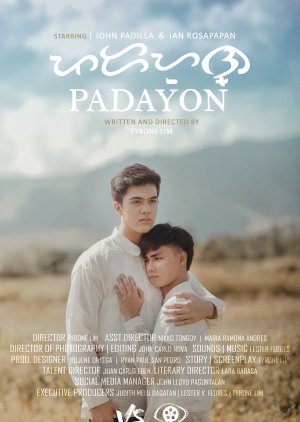
Esta resenha pode conter spoilers
One of the better pinoy low budget productions
The plot of this series is simple at a first glance: The neglected son of a rich landowner visits the manor house of his father's rural property and falls in love with the housekeeper's son who rescues him when he is attacked by the local gang of bullies. There are for a series as short as this (6 x 20 min) too many subplots to mention here, which is an advantage as it adds credibility to the story, but a disadvantage at the same time as it takes away space for the main couple.The script though is much better than in many of the numerous low budget productions. The main characters' background is explained in a surprising depth, and their development is understandable. Also, the situation of the rural population (like dependency on landlords who live in the city, restricted access to education, poverty because of unfair market conditions, and the disgusting wave of government-induced killings in the Philippines) is described extensively. The director and writer, Tyrone Lim, says he wants to tell a true story and educate. Maybe it's a bit too much education sometimes.
Of course, it can't be denied this a low budget production, but it's not as bad as many others. They've made the best out of these conditions, some landscape shots being really beautiful, with the predominance of the color brown hinting at the poor living conditions in that village.
I liked the acting of the main couple, Ian Rosapapan as Kai and John Padilla as Andre, whose performance is natural and credible, but I liked Yoyen Bautista as Kai's longtime best friend Drixler even more. I could feel his character's disappointment, jealousy and despair. What I don't really understand is why again like in many other pinoy bl-series there are trans characters that do not help develop the plot but are rather displayed in a merely comic way which doesn't do justice to this part of the lgbt community.
There are some highlight scenes in this series, e.g. Kai's family commemorating the killed father and Kai and Andre's mutual account of their childhood. The scene I liked most, however, is the climax of the plot, the confrontation of Andre, his (you may guess:) evil (ex-) girlfriend Elaine and Kai, which is appropriately commented on by the noisy competition of some (you may guess again:) roosters. This scene, and Elaine's final text message to Andre's father obviously serve as a cliffhanger for a season 2.
Finally, I must mention the extraordinary soundtrack by musical director Lester V. Flores who contributes some beautiful songs, especially 'Himig Ng Elehiya', sung by John Padilla, which is a heartbreakingly sad song obviously referring to the murder of Kai's father.
All in all, like some other pinoy bl-series this is not pure entertainment, a bit too much education sometimes, but very worth watching if you don't expect cinematographic perfection à la '1000 stars'.
Esta resenha foi útil para você?

they caught me
Yesterday i wrote a totally different review about padayon. I pointed out all of the bad points of this series, I resisted and it took me a long time to watch, but they caught me. They REALLY caugth my attention, man this drama is so good! I mean, all the discussions were threatened in a good way, were explored in a good way, and the big companies can copy this way to approach these discussions. The story is good, the actors are pretty good, they are beautiful, have good chemistry, the soundtrack was weak, I can deny. in the first chapter maybe you wont like but the second and the rest really hit hard. I'm looking forward to a new season, they need to invest!Esta resenha foi útil para você?

Esta resenha pode conter spoilers
An Interesting, but flawed production
I enjoyed watching this series, but at the end I felt disappointed because I don't think they hit the high target they set for themselves. They wanted to use a BL story to explore important social issues of socio/economic class, gender and identity discrimination, rural poverty, and so on. The main problem was that they had very limited budgets and not enough screen time to do this all successfully. So a lot of the social messaging came out as just preachy statements -- rather than showing viewers the problems, the characters just sat and stated their positions.Plot: Rich kid, marooned in the country, falls in love with a tenant farm boy. That part was pretty well done; the characters were believable and the story really did a nice job of showing some of the personal traumas (Kai's father's violent death, the family's mourning, and Kai's mother's acceptance of his love choices were very touching). Andre's conversion from insensitive clod to sympathetic figure was good. However, the script had a number of abrupt transitions (e.g. when Kai suddenly fell in bed with Andre), and when Kai (who previously seemed pretty well balanced, and had no problem suddenly sleeping with Andre) became unexpectedly wracked with gay angst in the last episode.) And the end left some key points really hanging (what happens to poor Brix? Is he just cast aside?)
Acting: Pretty good. Ian Rosapapan is charismatic and his smiles made the series. John Padilla did better at being the nasty little snot than the loving partner, but he was generally believable -- I thought his self-realization at the end was very well portrayed. Yoyen Bautista was similarly believable, and I really liked his character Brix (too bad he was left twisting slowly slowly in the wind). The farm women were believable, sitting around the fire and talking, but there wasn't enough time to explore their stories -- what kind of experiences did they have that led them to talk about the discrimination they had experienced? (I think there may have been some trans characters, but that never got clarified for me.)
Production: Very low budget. A few nice outdoor scenes but otherwise the only impressive scene was the family mourning for Kai's father. That one scene was truly beautiful.
Music: The soundtrack for the series was actually very good -- putting the audio a real step above most of the visuals. John Padilla sings nicely and a couple of the other songs were quite beautiful as background tracks. The music was well chosen and sensitively used.
The Ending: The very end clearly sets up a Season Two. It seems likely to introduce a range of new issues (Andre's angry family fighting his love interest in Kai), but those risk being real tropes. I hope that the writers are given more time to explore some of the issues that were just barely touched upon in Season One. And I hope that the main characters can develop more gradually, without abrupt emotional transitions. But I have to say that I have been drawn in by the actors and I want to know what happens to their characters, so I will definitely be watching.
Esta resenha foi útil para você?

A Quiet Gem
This is a surprisingly good series that has some production issues but its overall theme is outstanding. While the story is not new, it is presented in a very distinct fashion. The social issues of the transgender community is represented in this series with great sensitivity and reality. For that alone, it is worth a look-see. Perhaps it tries to tackle too much in a very short period of time but I believe its intent was to make aware of the plight of the transgender community. And that it does effectively.To read my full review go to BLBliss.com
Esta resenha foi útil para você?

Jeden z dalších nízkorozpočtových seriálů pinoy produkce mě tentokráte zaujal příběhem, méně už jeho někdy rozvláčným zpracováním, opakováním a protahováním. Z herců mě zaujaly především tři postavy - Kai (snaživý devatenáctiletý Ian Rosapan, Andre (John Padilla, nazpíval pro seriál i filmovou píseň) a Drixler, snad ještě i matka, kteří to za ostatní již slabší herecké výkony dotáhli u mě na sedmičku. Jedna, dvě, možná i více trans - nechápal jsem, jaký mají pro příběh význam, dle mě žádný a takto si divák může myslet, že filipínský venkov je v hojném počtu prošpikován transsexuály.
Esta resenha foi útil para você?

"Padayon": "Continue the fight"
In Bisaya, the second most spoken language in the Philippines after Tagalog, “Padayon” means “keep going, continue, move forward, do not give up, do not stop…”. It is common to hear the inhabitants of the Visayan Islands pronounce phrases in this language such as: "despite the difficulties, despite the difficult path, Padayon!". In Tagalog there is a term with a similar meaning: "patuloy".Another way to express this determination is “dasig lang,” which is a much deeper Bisaya version of the phrase. "Laban lang" is the Tagalog version, which is also frequently used in the Visayas. All of these expressions essentially translate as "keep fighting".
Whichever phrase you choose, it sums up the spirit that moves 'Padayon', a miniseries written and directed in 2021 by Tyrone Lim Pasaylo, a Filipino accountant turned filmmaker, writer and director Founder of DILAT Productions, who has in this romantic drama of LGBT+ genre, his only film work to date.
Among the successes of 'Padayon', a low-budget Pinoy production is the profitability of the natural space, not as a mere casual vector of setting, or much less as a postcard background commissioned by the Philippine Ministry of Tourism. It is something that I do not point out in vain, since it is also done quite a bit; although in other types of work of lower quality and achievements, or self-respect.
This is not the case: Tyrone Lim Pasaylo's team (mainly himself as scriptwriter and director, in addition to the director of photography and Maria Andres as co-writer) has taken due note of the lessons of Filipino series in particular and Asian series in general, by turning the environment into a dramatic subject and a significant contributor to the ominous atmosphere of the material.
This story places its story in a beautiful rural area, whose exuberance, warm temperatures, impressive fields of plowing and harvesting crops, majestic rivers, and the photography of John Carlo Nova, brilliantly interrelates the plot through close frames, of excellent composition. Ocher or brown colors predominate to highlight the atmosphere of poverty and humility in rural Filipino communities. The exterior images are bright and clear, although with a predominance of the same colors.
Kai Andres (defended with great acting character by actor Ian Rosapapan, one of the best in the play), is a young man who aspires to graduate from university, but circumstances force him to delay his wishes to help his mother Karrisa Andres ( Marga Erasmo), in the cleaning, gardening and maintenance of a luxurious hacienda in the Philippine countryside.
It's a pleasure to rediscover Ian Rosapapan, whom we already admired in his brief but intense role as Kyle in the drama 'Why Love Why Season 2'.
The boy has a simple, but happy life. He helps his mother in the mansion, who works as the housekeeper of the old manor house, while helping to support his humble home, where his sister Kira (Harlene Mayor) also lives. He has a group of good friends, among which Drixler "Drix" Penamonte (Yoyen Bautista) stands out.
But everything changes when Andre Rodriguez (John Padilla, in his debut and only role in his acting career so far) suddenly arrives at the ranch, the young heir to the rural property branded as a playboy and with an impressive feeling that leaves with the The mouth pours water on more than one of the characters and spectators, who has been punished by his abusive father by sending him to the remote region.
This will be the start of a series that, despite always traveling on known plot ground, resists conventionality. The script bridges or relaxes, as appropriate, the complex process of discovery and self-acceptance, since both boys will fall in love despite starting their relationship on the wrong foot, since, unlike Kai, the newcomer is an arrogant and vain boy.
To do this, the series is based on a pillar like the character of Kai, whose load of kindness, camaraderie and good heart enriches the piece. Ian Rosapapan brings the charm, naivety and mischief that the role demands.
For his part, Andre's character learns from Kai honesty, humility, trusting others, asking for forgiveness, being grateful and loving.
Although there is curiosity about "the two boys who are suddenly friends and go to the river alone and spend time together", there is no sign of homophobia. After all, all the young people around Kai and Andre are queer characters and in one way or another they express their homosexuality or transsexuality.
The series also addresses, among other topics, family relationships and the family's acceptance of their son's homosexuality.
Also highlight the soundtrack, in which we will hear John Padilla performing the musical themes "Viaje" and "Himig NG Elehiya", composed by Lester V Flores, and also others, such as "Tanong sa Langit", by Paulo Zingapan, "Mahalaga ", performed by Rojene Ortega, and "Hinto", by Angelique Ferro.
'Padayon' is not very romantic, but it offers a pleasant and affectionate time, and the love story, which can give the sensation of being unbalanced, also works.
Among its main successes is that, without mincing words, the series points an accusing finger at some of the problems faced by the Filipino peasantry, such as difficult access to education, rural poverty that dates back to the country's colonial policies, the persecution of Filipino farmers who advocate for the fair implementation of the land reform program by the government, threats against their fundamental rights to land, life, housing, livelihoods and basic freedoms, the continued and systematic criminalization of rural peasant movements through the presentation of false charges by landowners, influential claimants and companies and their agents, among other problems that result in greater poverty and marginalization of peasant communities through physical displacement and economic towards a future of uncertainty.
On the other hand, it explores the complex problems of the transgender community, identity, gender discrimination, among others, such as personal improvement, desire to fight and work as ways to get ahead.
It hurts deeply that many subplots are left unexplained and unresolved: for example, the motivations for the murder of Kai's father are not explained. Are you dying for your commitment and participation in the social struggle for improvements in the working and living conditions of the Filipino peasantry? Are you a political and agrarian activist? None of this is clear. He could have been murdered for any other reason beyond political and social reasons.
Other subplots that remain open are that of Elaine Eugenio (Milen Alonde), Andre's ex-girlfriend, who arrives at the ranch to, in addition to trying to win back her boyfriend, serve as a spy for the co-star's father. And that of Drix, Kai's jealous and desperate friend for the future.
The six episodes are binged in one go. Its little more than 20 minutes pass quickly, due to the rhythm and the distribution of plateaus and dramatic climaxes. Now, what he successfully builds throughout those chapters, 'Padayon' destroys it in the epilogue.
In the sixth and last episode, a series that – by virtue of its nerve and craft – seemed to obtain a better conclusion, is not consistent with itself. For two reasons: the first: it is a shame that its low budget and the short time available for putting it on the screen has not allowed us to delve into the complex themes exposed in its premise, in fact, little addressed in Pinoy and BL dramas in general.
These outlined objectives, instead of being analyzed in depth, are presented in a way that is too didactic and explanatory, in the style of sermons, with the characters sitting around a bonfire or at their jobs in the field, expressing dispersed and diverse opinions to send messages social. The series talks about social struggles, but the characters spend the day working and having fun in the countryside and show no real interest in changing the economic and political-social situation of the country.
It would surely have been more far-reaching to have shown the viewer the problems faced by Filipino rural workers, on the one hand, and members of the LGBT+ community, especially homosexuals and transgenders, on the other, and their struggles to "move on". "Padayon!".
And the second cause: he then succumbs to a scammer, unintelligent closure. Logical, it is explained in the commercial intentions, in the clear (and reckless) desire for continuity in a second season. But that's not worth it. Today, three years and seven months after its premiere, we have no continuation or ending to this story.
Esta resenha foi útil para você?





































